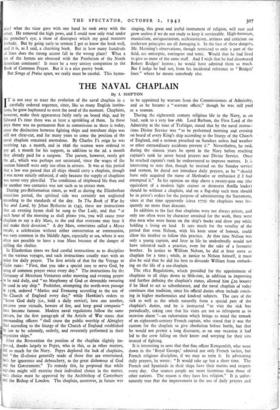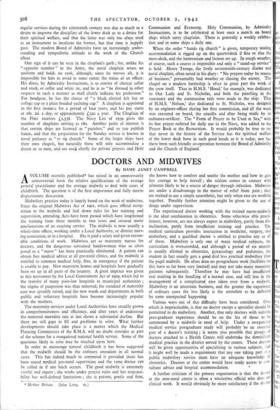THE NAVAL CHAPLAIN
By I. S1LIPTON IT is not easy to trace the evolution of the naval chaplain in a carefully ordered sequence, since, like so many English institu- tions, he grew haphazard to meet the need of the moment. Chaplains, however, make their appearance fairly early on board ship, and by Edward I's time there was at least a sprinkling of them. In those days there was no permanent fleet in commission as there is today, since the distinction between fighting ships and merchant ships was still not clear-cut, and for many years to come the position of the naval chaplain remained anomalous. By Charles I's reign he was receiving r4s. a month, and in 1626 the seamen were ordered to pay 4d. a month for his support, in addition to the 2d. a month they already paid for a surgeon. The parson, however, rarely got the 4d., which was perhaps not unnatural, since the wages of the seaman himself were only too often in arrears. It was at this period that a law was passed that all ships should carry a chaplain, though it was never strictly enforced, if only because the supply of chaplains was never very plentiful. The conditions of shipboard life then and for another two centuries was not such as to attract men.
During pre-Reformation times, as well as during the Elizabethan transition period, the spiritual side was certainly not neglected according to the standards of the day. In The Book of War by Sea and Land, by Jehan Bytharne in 1543, there are instructions that an evening hymn shall be sung to Our Lady, and that " at such hour of the morning as shall please you, you will cause your chaplain to say a dry Mass, to the end that everyone may hear it and make their devotion." A dry Mass, sometimes called a Messe navale, a celebration without either consecration or communion, was very common in the Middle Ages, especially at sea, where it was often not possible to have a true Mass because of the danger of spilling the chalice.
In Elizabethan times we find careful instructions as to discipline on the various voyages, and such instructions usually start with an order for daily prayer. The first article of that for the Voyage to Cadiz runs : " First, that you take a special care to serve God, by using of common prayer twice every day." The instructions for the Company of Merchant Venturers order morning and evening prayer to be said daily, and " no blasphemy of God or detestable swearing be used in any ship." Frobisher, attempting the north-west passage in 1576, ordered " Matins and Evensong according to the use of the Church of England every day," while Hawkins's orders to 'Serve God daily (i.e., hold a daily service), love one another, preserve your victuals, beware of fire, and keep good companie " have become famous. Modern naval regulations follow the same pattern, for the first paragraph of the Article of War states that commanding officers " shall cause the public worship of Almighty God according to the liturgy of the Church of England established by law to be solemnly, orderly, and reverently performed in their respective ships."
After the Restoration the position of the chaplain slightly im- proved, thanks largely to Pepys, who in this, as in other matters, did so much for the Navy. Pepys deplored the lack of chaplains, and " the ill-choice generally made of those that are entertained, both for ignorance and debauchery, to the great dishonour of God and the Government." To remedy this, he proposed that while captains might still exercise their individual choice in the matter, such choice must be approved by the Archbishop of Canterbury and the Bishop of London. The chaplain, moreover, in future was to be appointed by warrant from the Commissioners of Admiralty, and so he became a " warrant officer," though he was still paid as a seaman.
-During the eighteenth century religious life in the Navy, as on land, sank to a very low ebb. Lord Barham, the First Lord of the Admiralty at the time of Trafalgar, stated that by the naval instruc- tions Divine Service was " to be performed morning and evening on board of every King's ship according to the liturgy of the Church of England, and a sermon preached on Sundays unless bad weather or other extraordinary accidents prevent it." Nevertheless, he said, during the sixteen years he spent in the Navy before reaching captain's rank he never heard prayers nor Divine Service. Once he reached captain's rank he endeavoured to improve matters. It is interesting to note that, though he insisted on the Sunday service and sermon, he dared not introduce daily prayers, as he " should have only acquired the name of Methodist or enthusiast if I had attempted it." In his opinion no ship above a twenty-gun one (the equivalent of a modern light cruiser or destroyer flotilla leader) should be without a chaplain, and on a flag-ship such men should be in priest's orders for the purpose of administering the Sacrament, since at that time apparently (circa 177o) the chaplains were fre- quently no more than deacons.
In addition to the fact that chaplains were not always priests, and only too often were by character unsuited for the work, there were also men who were borne on the ship's books and drew pay while holding a living on land. It says much for the venality of the period that even Nelson, with his keen sense of honour, could allow his brother to follow this practice. At that time Nelson was only a young captain, and later in life he undoubtedly would not have tolerated such a practice, even for the sake of a favourite brother. In justice to William Nelson, he did at least serve as chaplain for a time ; while, in justice to Nelson himself, it must also be said that he did his best to dissuade William from embark- ing on the life of a sea-chaplain.
The 1812 Regulations, which provided for the appointment of chaplains to all ships down to fifth-rate, in addition to improving and further defining the chaplain's status, allowed him L2o bounty if he liked to act as schoolmaster, and the naval chaplain of today continues that tradition, since his official duties often include coach- ing in higher mathematics and kindred subjects. The care of the sick as well as the whole naturally form a special part of the chaplain's duties, and he is instructed " to visit the sick bay periodically, taking care that his visits are not so infrequent as to occasion alarm "—an exhortation which brings to mind the remark of an eighteenth-century French captain, who stated that it was the custom for the chaplain to give absolution before battle, but that he would not permit a long discourse, as on one occasion it had led to the crew falling on their knees and weeping for their sins instead of fighting.
It is interesting to note that that fine officer Kempenfelt, who went down in the ' Royal George,' admired not only French tactics, but French religious discipline, if we may so• term it. In advocating daily prayers, he wrote : " It would take up but a short time. The French and Spaniards in their ships have their matins and vespers every day. Our seamen people are more licentious than those of other nations. The reason is they have less religion." It is unfor- tunately true that the improvement in the use of daily prayers and
regular services during the nineteenth century was due as much to a desire to improve the discipline of the lower deck as to a desire for their spiritual welfare, and that the latter was only too often used as an instrument to inculcate the former, but that time is happily past. The modern Board of Admiralty have an increasingly under- standing and sympathetic attitude to the work of the Church afloat.
One sign of it can be seen in the chaplain's garb ; for, unlike his " opposite number " in the Army, the naval chaplain wears no uniform and holds no rank, although, since he messes aft, it is impossible for him to avoid to some extent the status of an officer. His dress, by Admiralty Instructions, is to consist of clerical collar and stock, or collar and white tie, and he is to " be dressed in other respects in such a manner as shall clearly indicate his profession." For headgear, he has the choice of " a black clerical felt hat or college cap or a plain braided yachting cap." A chaplain is appointed in the first instance for a period of four years, and his pay starts at 18s. 2d. a day, or approximately £320 a year. The Chaplain of the Fleet receives £1,538. The Navy List of 1939 gives the number of chaplains serving as 180. Another point of interest is that certain ships are licensed as " parishes," and so can publish banns, and that the preparation for the Sunday service is known in naval parlance as " to rig church." Some of the larger ships have their own chapels, but naturally these will only accommodate a dozen or so men, and are used chiefly for private prayers and Holy Communion and Evensong. Holy Communion, by Admiralty Instructions, is to be celebrated at least once a month on board ships which carry chaplains. There is generally a weekly celebra- tion and in some ships a daily one.
When the order " hands rig church " is given, temporary seating accommodation is rigged up on the quarterdeck if fine or else the mess-deck, and the harmonium and lectern set up. In rough weather, of course, such a course is impossible and only a " stand-up service " is held. Henry Teonge, the lively seventeenth-century diarist and naval chaplain, often noted in his diary : "No prayers today by reason of business," presumably bad weather or chasing the enemy. The chapel on a modern battleship is often in great part the work of the crew itself. That in H.M.S. 'Hood,' for example, was dedicated to Our Lady and St. Nicholas, and both the panelling in the sanctuary and the communion rails were made in the ship. That of H.M.S. ' Nelson,' also dedicated to St. Nicholas, was designed by an engineer-officer during her first commission, and all the work was executed on board, the crucifix and altar being made by an ordnance-artificer. The " Form of Prayer to be Used at Sea," with its fine prayer ordered for daily use in the Navy, was added to the Prayer Book at the Restoration. It would probably be true to say that never in the history of the Service has the spiritual welfare of the lower deck been in such good hands as it is today, nor has there been such friendly co-operation between the Board of Admiralty and the Church of England.



























 Previous page
Previous page